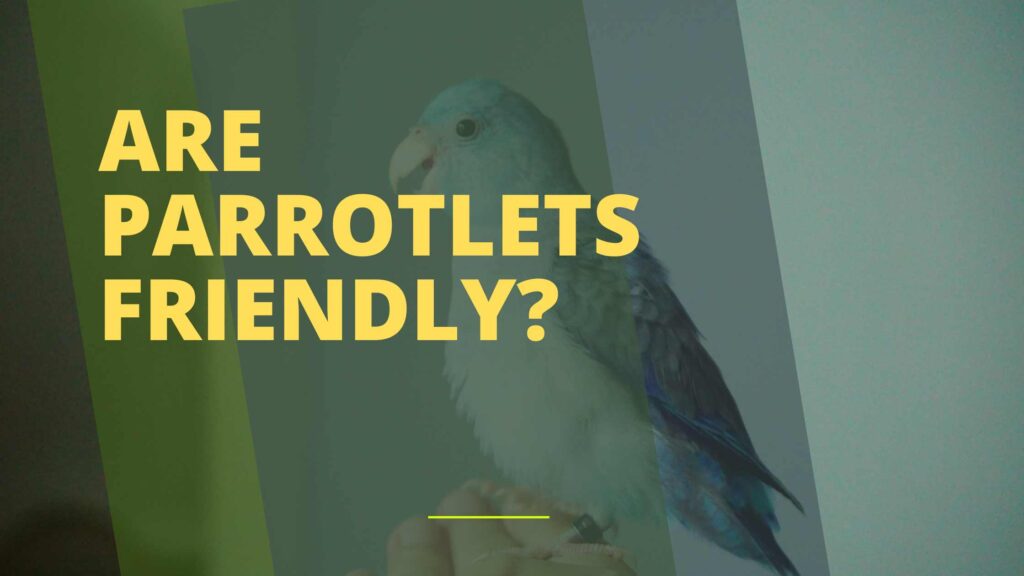Parrotlets are generally friendly, especially when socialized early and consistently. They develop strong bonds with their owners.
Table of Contents
Parrotlets, with their vibrant personalities and compact size, make delightful companions for bird enthusiasts. Known for their intelligence and playful nature, these small parrots thrive on interaction and can learn a variety of tricks. Building trust with a parrotlet involves patience and gentle handling, as they can be shy at first but often exhibit a sociable disposition as they become comfortable.
Are Parrotlets Friendly? Offering a balance between affectionate companionship and independent play, parrotlets are a favored choice for those seeking a pet bird that is both engaging and manageable. Ensuring that your parrotlet remains well-socialized is key to maintaining their friendly demeanor throughout their life.
Introduction To Parrotlets
Imagine a charming, colorful bird with the personality of a large parrot but in a pint-sized package.
Meet the parrotlet: a pocket-sized parrot that brings a world of joy to bird enthusiasts everywhere.
These small, vibrant birds capture hearts with their playful nature and affectionate demeanor.
A Tiny Parrot With A Big Personality
Don’t let their small stature fool you;
parrotlets may be tiny, but they are brimming with character and energy.
Traits such as intelligence, curiosity, and a loving personality define these feathered friends.
They form deep bonds with their owners and showcase a wide range of emotions and behaviors.
- Intelligent and able to learn tricks
- Curious about their surroundings
- Loyal to their human companions
The Rising Popularity Of Parrotlets
Parrotlets are gaining attention as the ideal pet for both apartment dwellers and seasoned bird lovers.
Their small size suits tight spaces, and their low maintenance nature suits busy lifestyles.
The parrotlet’s vibrant colors and charming quirks make it an irresistible choice for a feathered friend.
| Parrotlet Trait | Benefit |
|---|---|
| Size | Perfect for small living spaces |
| Maintenance | Easier care compared to larger parrots |
| Personality | Friendly and engaging companions |
Parrotlet Personality Traits
Parrotlets may be tiny, but they pack a big personality. These charming birds are known for their vivid character traits that can light up any bird lover’s life.
Intelligence And Playfulness
Parrotlets are smart little creatures. They love puzzles and engaging activities. This intelligence makes them curious and eager learners. Activities and games stimulate their minds, keeping them entertained for hours. Owners often marvel at their parrotlets’ clever antics.
Behavioral Complexity
- Emotional range: These birds can feel joy, excitement, and even frustration.
- Mimicry skills: Some can mimic sounds, showing their adaptability.
- Body language: Watch for fluffed feathers or chirps, as they communicate emotions.
Understanding their behavior patterns enriches the bond between owner and bird.
Independence Vs. Social Needs
While parrotlets have an independent streak, they also crave interaction. They form strong bonds with their human companions. Daily interaction is key to a happy parrotlet. It’s a balance between autonomy and social connection.
| Alone time: | Enjoy personal space for rest and play. |
| Togetherness: | Seek affection and companionship. |
The Friendliness Factor
When exploring the world of petite parrots, the friendliness factor of parrotlets often comes into question. These small birds boast big personalities. Let’s delve into what makes them delightful companions.
Interaction With Humans
Parrotlets may be tiny, but their ability to bond with humans is immense. With regular, gentle handling, these birds grow fond of their owners. Like all pets, trust-building is key. Start by spending time near their cage every day. Gradually, parrotlets learn to associate their human friends with positive experiences, like treats and soft talking, leading to frequent interactions and stronger bonds.
Parrotlet Socialization
For a well-adjusted parrotlet, socialization is crucial. Introduce these feathery friends to different people and safe environments early on. This helps them become confident and sociable pets. Parrotlets have a gregarious nature and enjoy interaction. Without socialization, they might become shy or even nippy. Regular playtime and introduction to new sights and sounds help them become adaptive and friendly.
Understanding Their Moods
Parrotlets communicate their feelings in various ways. By observing their body language, owners can understand their moods. A relaxed parrotlet might sing or chirp softly, a sign of contentment. Conversely, a puffed-up bird could be trying to appear big to ward off what they perceive as a threat which indicates they need space. Recognizing these cues allows owners to respond appropriately and maintain a happy relationship with their parrotlet.

Credit: m.facebook.com
Factors Influencing Friendliness
Parrotlets, with their vibrant feathers and chatty nature, are a delight to bird enthusiasts. Yet, their friendliness often hinges on several factors. Understanding these can help nurture a sweet, amiable companion. Let’s explore the elements that sculpt the sociable character of these petite parrots.
The Role Of Early Socialization
Just like humans, parrotlets are shaped by their early experiences. Birds that interact with people and other birds from a young age tend to be more outgoing. They learn that humans are friends, not foes. Simple activities like speaking to your bird daily or allowing exploration outside the cage can make a huge difference in their social skills.
The Effects Of Environment
A comfortable home equals a happy parrotlet. These birds thrive in environments where they feel safe and stimulated. Consider factors such as cage size, toys, and perches. Ensure they have ample room to play and rest. A variety of toys encourages mental and physical activity, fostering a content and sociable bird.
Human-parrotlet Bonding
Regular interaction is key to a trust-filled relationship. Spending time with your feathery friend is crucial. Engage in gentle play, training sessions, and even relaxed cuddling. This not only nourishes your bond but also stimulates your parrotlet’s sociable instincts. Remember, patience and consistency are your best tools in forging a deep bond with your bird.
Training Your Parrotlet
Wondering if parrotlets make friendly companions? Absolutely, and training plays a huge role in nurturing their friendly nature. A well-trained parrotlet can be the perfect little feathered friend, full of affection and playful antics. Let’s dive into the best ways to train your parrotlet to ensure a strong, happy bond between you both.
Positive Reinforcement Techniques
Positive reinforcement is key in parrotlet training. This method rewards good behavior, encouraging your bird to repeat it. Rewards can include treats, praise, or playtime. Here’s how you can use positive reinforcement:
- Identify the reward: Figure out what your parrotlet loves most.
- Timely rewards: Give the treat right after the desired behavior.
- Use a command: Pair a word or clicker noise with the reward.
- Be consistent: Regular practice leads to better results.
- Keep sessions short: Little birds have short attention spans.
Establishing Trust
Before diving into training, establish trust with your parrotlet. This creates a positive training environment. Here’s how to build a bond of trust:
- Move slowly: Sudden moves can scare your bird.
- Speak softly: Use a gentle tone when talking to your parrotlet.
- Regular interaction: Spend time each day with your parrotlet.
- Respect their space: Let them come to you when they’re ready.
- Show patience: Trust takes time to develop.
Social Needs Of Parrotlets
Parrotlets, with their vibrant personalities, demand robust social interaction. Understanding their social needs is key to ensuring they lead happy, fulfilling lives. Providing the right companionship and engaging activities forms an integral part of their care.
Companionship Requirements
Parrotlets thrive on attention and interaction with their human families. These tiny parrots form deep bonds and require daily socialization to remain content. Without companionship, they can develop behavioral issues or suffer from loneliness.
- A dedicated playtime each day strengthens the bond between parrotlets and their owners.
- Introducing them to various family members helps to socialize them.
- Fellow parrotlet companions can be beneficial, but introductions must be done carefully.
The Importance Of Stimulating Activities
A stimulating environment prevents boredom and promotes mental health for parrotlets. These intelligent birds need activities that challenge them mentally and physically.
- Interactive toys should be rotated regularly to keep their interest piqued.
- Training sessions for tricks and commands enrich their routine.
- Foraging toys encourage natural behaviors and provide mental exercise.
Remember, fulfilling the social needs of parrotlets with companionship and stimulating activities leads to a joyous and engaging pet experience.
Common Behavioral Issues
When you invite a parrotlet into your home, expect a ball of energy with charming traits. Yet, like all creatures, they can develop some behavioral hitches. Understanding these quirks is key to a harmonious relationship with your feathered friend.
Biting And Aggression
It’s not uncommon for parrotlets to nip or show aggression. These small birds pack a punch with their beaks. Their behavior might stem from fear, territorial instincts, or even excitement. If your parrotlet is lashing out, observe to find the trigger. Are they scared or protecting their space?
Aggression can also peak during breeding seasons. Hormones flare, and your petite pal may become more territorial. Recognize these signals to prevent bites:
- Feathers fluffed up
- Eyes pinning
- Sudden movements towards your hand
Mitigating Negative Behaviors
Addressing unwanted behaviors in parrotlets begins with patience and understanding. Start with consistent training. Use positive reinforcement to reward good behavior. When your parrotlet steps up without biting, offer a treat or praise. It tells them, “This makes my human happy!”
Next, remember the importance of social interaction. Parrotlets thrive on time with their owners. Neglect can lead to boredom and bad habits. Ensure your bird has variety in their day to keep their brains buzzing with activity.
Creating a trusted environment helps too. Avoid loud noises or sudden movements. A calm space makes for a calm bird. Regular playtime and gentle handling reinforce your bond, easing aggression.
Consider their habitat. Is their cage roomy? Do they have toys to engage with? A stimulating environment prevents boredom, curbing destructive behaviors. Rotate toys and offer puzzle feeders to keep their bright minds occupied.
If biting persists, consulting an avian behaviorist might be your next step. They offer targeted strategies to iron out kinks in your parrotlet’s demeanor, promoting a peaceful coexistence.

Credit: lafeber.com
Choosing The Right Parrotlet
Parrotlets, often known as pocket parrots, charm bird enthusiasts worldwide. Their vibrant personalities packed into tiny bodies fascinate many. But are these birds naturally friendly? Yes, with the right approach in choosing and raising them, these petite parrots can form loving bonds.
Selecting A Friendly Parrotlet
When searching for a parrotlet, it’s crucial to observe their interaction with humans and other birds. Birds showing curiosity and calmness are ideal. Signs of aggression or fear, such as retreating or biting, might indicate a less friendly bird. Visit reputable breeders or adoption centers where birds are well-socialized.
- Check the bird’s history: Has it been around many people?
- Watch the bird’s behavior: Does it approach willingly?
- Handle the bird if possible: Is it comfortable in your presence?
Expectations vs. Reality
Expectations Vs. Reality
While parrotlets have a reputation for being friendly, each bird has a unique personality. Prospective owners should adjust their expectations. Not all parrotlets will cuddle or interact in the same way.
| Expectation | Reality |
|---|---|
| All parrotlets love to be handled. | Some prefer occasional petting or watching from a distance. |
| Parrotlets are always sociable. | Individuals may vary in sociability and it can depend on their mood or environment. |
Time, patience, and training are key in shaping a pet parrotlet’s friendliness. Consistent positive interactions foster trust, and with it, a deeper bond grows.
Real-life Experiences With Parrotlets
Many people wonder just how friendly parrotlets can be. These tiny parakeets, known for their vibrant personalities, often reveal unique traits as they interact with their owners. Real-life experiences highlight the true nature of these feathery friends. Here’s what parrotlet owners have to say about their pint-sized companions.
Owner Testimonials
- Jane from Florida: “My parrotlet, Kiwi, greets me every morning with chirps and twirls. It’s like having a friend always eager to see you!“
- Alex in California: “Luna, my parrotlet, loves to cuddle. She’s taught me patience, as earning her trust took time but was so rewarding.“
Living With A Parrotlet: Pros And Cons
| Pros | Cons |
|---|---|
| Companionship – Parrotlets are affectionate and bond closely with their owners. | Attention-Seeking – They require regular interaction, which can be demanding. |
| Intelligence – They’re able to learn tricks and mimic sounds. | Noise Level – Parrotlets can be quite vocal, which might be too much for some households. |
| Size – Their small stature means they need less space than larger parrots. | Sensitivity – They need a stable environment as they can get stressed easily. |

Credit: www.wikihow.pet
Conclusion: Is A Parrotlet Right For You?
Choosing the right pet is a big decision. Parrotlets may be small, but their personalities are huge. They can make loyal and entertaining companions, yet they require careful consideration.
Evaluating Your Decision
- Time Commitment: Do you have enough time to spend with a feathered friend? They thrive on interaction.
- Space: Is there space in your home for a cage and flying room?
- Other Pets: Consider the safety and harmony of any existing pets.
- Longevity: Remember, parrotlets can live up to 20 years.
The Joy Of Parrotlet Companionship
Parrotlets are known for their vibrant colors and playful nature. Their intelligence makes them fun to train and interact with.
A well-cared-for parrotlet can be a source of constant delight and companionship. Their sociable antics can brighten your days.
Think about the joy a tiny, chatting friend could bring into your life. If heartwarming feathered bonds appeal to you, a parrotlet might be the perfect match.
Conclusion
Parrotlets have proven to be delightful companions for bird enthusiasts. Their sociable nature and intelligence make them an excellent choice for those seeking a smaller parrot with a big personality. As you consider adding a parrotlet to your family, remember that consistent interaction and proper care are key to fostering a friendly bond.
Embrace the joy these pint-sized parrots bring with their vibrant colors and charming demeanor.
Ryan Everhart is a passionate bird enthusiast and blogger, primarily writing on his website, Avian Whispers. His journey into the world of bird blogging began with a deep interest in parrots, a species that captivated his attention for their intelligence and social behavior. Over time, his content expanded to cover a broader range of bird species, offering insights into bird behavior, care, habitats, and conservation.
Ryan is dedicated to educating his audience, which includes both new bird owners and seasoned enthusiasts. His writing is filled with personal experiences, expert knowledge, and practical advice on bird care. Through Avian Whispers, he aims to foster a deeper appreciation for birds, emphasizing their role in nature and the joys of having them as pets.
Starting with articles focused on parrots, Ryan’s work now encompasses a diverse range of topics such as feeding, training, habitat enrichment, and bird health. His love for birds extends beyond parrots, diving into various avian species. His informative and heartfelt writing reflects his commitment to the well-being of birds and the desire to help others connect with these creatures.
As a growing voice in the bird blogging community, Ryan strives to provide a platform where bird lovers can learn, share experiences, and connect over a shared passion for avian life. His blogs are not only educational but also serve as a reminder of the importance of protecting and nurturing the bond between humans and birds.




